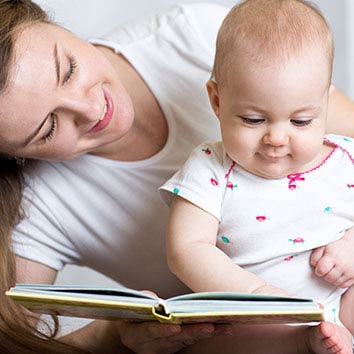To help you monitor your child’s hearing ability and subsequent behavioral responses, Huggies has come up with a simple checklist. This checklist indicates behaviors that are age appropriate for the detection of hearing loss. Additionally, we have a list of what you can do to help your child learn how to speak and to use their hearing.
If your child fails to respond as the checklist suggests, there may be problems that require further evaluation. Talk about it with your physician, who will then refer you to an ENT (ear, nose and throat) Specialist, as well as an Audiologist for further investigation.
Checklist for speech and hearing
3 - 6 months
- Your child should awaken or quieten to the sound of your voice.
- They will typically turn their eyes and head in the direction of the sound source.
7 - 10 months
- Your child should be able to turn their head and shoulders towards familiar sounds, even when they cannot see what is happening.
- Sounds do not have to be loud to cause them to respond.
11 - 15 months
- Your child should show signs of understanding some words by appropriate behavior. For example, they should be able to point to or look at familiar objects on request.
- They may jabber in response to a voice, may cry when there is loud thunder and may frown when being scolded.
18 months
- Some children begin to identify parts of the body.
- They should be able to point to their eyes or nose on request.
- They should be using a few words, such as 'bye-bye'.
- The words may not be complete or pronounced perfectly but are clearly meaningful.
2 years
- Your child should be able to follow a few simple commands without visual cues.
- They should be using a variety of everyday words heard at home.
- Children of this age enjoy being read to and shown simple pictures in a book and will point them out when asked.
2.5 years
- Your child should be able to recite or sing short rhymes or songs and enjoy listening to music or watching cartoons.
- If your child has good hearing, these songs will make them happy, and they would react to the sound by running to look at it or by telling someone what they hear.
3 years
- Your child should be able to understand and use some simple verbs (such as 'go'), prepositions (such as 'in' or 'on'), adjectives (such as 'big'/'small') and pronouns (such as 'I'/'you').
- They should be able to locate the source of the sound and be able to use complete sentences at least sometimes.
4 years
- Your child should be able to give connected accounts of a recent experience or event.
- They should be able to carry out a sequence of two simple directions - such as 'take the ball and give it to mummy'.
5 years
- Your child's speech should be understandable, even though at times they may mispronounce certain words.
- Most children by this age can carry on a conversation, if the vocabulary is within their experience.
Tips to encourage your child to speak and hear better
4 months
- Imitate whatever sounds your child makes.
- Talk to your child using a pleasant tone of voice.
- Call out to your child while you work around the house. Like, “Hi my lil’ baby… What are you doing?”
7 months
- Keep on imitating your child's babbling sounds and talk to them regularly.
- Hold your child close to you and sing to them or talk repeatedly.
- Talk about their favorite toys and play games such as "peek-a-boo".
9 months
- Make simple speech sounds to see if your child will imitate you ( For example, "gah-gah").
- Respond to them when your child calls out to you.
- Indulge in interactive games and activities.
12 months
- Show your child parts of the body. For example, say "Here's your nose" and place his hand on it.
- Show them simple picture books and describe the pictures to them.
- Play "Where's papa?" and point to papa.
- Explain sounds. For example, “What does a doggy say?" - Then vocalize 'bow-wow'.
24 months
- Read simple books to your child and ask questions like "Where's the cow?" and point out to a picture of the cow in the book.
- Ask them to put or take things away. For example, "Give papa the truck."
- Talk about everything he plays or sees.
Warning signs to look out for in your child (above 5 years)
If your child exhibits any or all these signs, it’s best to consult your physician for a further audiological investigation.
- Has speech delay or deteriorating speech.
- Continually asks to repeat what was said.
- Gives inappropriate responses to questions.
- Does not hear background noise.
- Likes the television volume to be tuned up.
- Absolutely hates sudden loud noises.
- Watches your face for visual cues.
- Forgets instructions and seems to daydream.
- Either shouts or whispers (as they are unable to monitor own voice levels).
- Has poor concentration.
- Appears slower than other children.
- Has balance problems (appears clumsy).
- Complains of noises in the ears.











